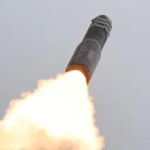Spain battles deadliest flood disaster in decades as death toll rises to 95
Spain is facing its most severe flooding disaster in decades, resulting in at least 95 fatalities and many more individuals unaccounted for after intense rains inundated the eastern province of Valencia and surrounding areas.
On Tuesday, torrential downpours caused flash floods that demolished bridges and buildings, forcing residents to seek refuge on rooftops or cling to trees for survival.
Prime Minister Pedro Sánchez has announced three days of national mourning as the extreme weather persists, hampering some rescue operations.
The government has indicated that the death toll may rise, as “many people are still missing.”
Valencia has recorded at least 92 deaths, with two more in Castilla-La Mancha to the west and one in Málaga—a 71-year-old British man who died in the hospital after being rescued from his home.
This flooding has resulted in the highest death toll in the country since 1973, when an estimated 150 people perished during the worst floods in southeast Spain.
In his national address on Wednesday, Sánchez urged citizens to stay alert and promised a comprehensive recovery, assuring victims, “The whole of Spain weeps with you… we won’t abandon you.”
Chiva, one of the first towns hit near Valencia, reported receiving a year’s worth of rainfall in just eight hours on Tuesday, according to the national weather agency Aemet.
As Spanish army and emergency crews rushed to carry out rescues on Wednesday morning – including winching people to safety from balconies and car rooftops – survivors in Valencia recounted the horror of the floods on Tuesday night.
Sudden surges turned streets and roads into rivers, catching many motorists unaware.
Guillermo Serrano Pérez, 21, from Paiporta near Valencia, said the water had rushed down a highway “like a tsunami”, forcing him and his parents to abandon their car and climb on to a bridge to survive.
Another witness recounted a scene when motorway drivers realised a torrent of water was heading towards them and formed a human chain to escape along a raised central reservation.
“Thank goodness no one slipped because if anyone had fallen, the current would have dragged them away,” Patricia Rodriguez, 45, told El País newspaper.
One resident of La Torre told the BBC some of his friends had lost their homes, and on Tuesday night he “saw cars floating in the water” and the tides “breaking through some walls.”
Meanwhile, the mayor of Horno de Alcedo, a town just outside Valencia, told BBC Newshour how the water levels rose by more than a metre in just a matter of minutes.
“The currents were so quick – and we called the emergency services who started rescuing some people who had water up to their necks”, Consuelo Tarazon said.
There are widespread accusations in Spain that in many cases, disaster relief authorities were too slow to act with warnings, meaning people could not get off roads or seek higher ground.
The civil protection agency, deployed during national disasters, did not issue an alert until 20:15 on Tuesday evening local time – but by then, Chiva and several other towns had already been flooded for at least two hours.
Valencia’s regional government has also been forced to defend its decision to scrap the Valencia Emergency Unit, which had been set up by the previous government to tackle natural disasters such as flooding and wildfires.
Spain deployed more than 1,000 troops to help with rescue efforts on Wednesday, but many crews remain cut off from towns by flooded roads and downed communication and power lines.
The European Union’s chief, Ursula von der Leyen, said it had activated its Copernicus satellite system to help co-ordinate Spanish rescue teams. Other European neighbours have also offered to send reinforcements.
Spain’s Defence Minister Margarita Robles had said earlier on Wednesday the flooding across the region was “an unprecedented phenomenon”.
The downpour eased in the country’s central-east on Wednesday, but weather officials warned the rains were moving north-east to the Catalonia region. Weather warnings have also been issued across several other parts of the country, urging people to brace for floods and take shelter.
Many factors contribute to flooding, but a warming atmosphere caused by climate change makes extreme rainfall more likely.
Weather researchers have identified the likely main cause of the intense rainfall as a “gota fria” – a natural weather event that hits Spain in autumn and winter when cold air descends on warmer waters over the Mediterranean.
However, the increase in global temperatures had led to the clouds carrying more rain, scientists told the BBC.
“With every fraction of a degree of fossil fuel warming, the atmosphere can hold more moisture, leading to heavier bursts of rainfall,” said Dr Friederike Otto, from Imperial College London, who leads an international group of scientists who try to understand the role that warming plays in these type of events.
“No doubt about it, these explosive downpours were intensified by climate change.”
The world has already warmed by about 1.1C since the industrial era began and temperatures will keep rising unless governments around the world make steep cuts to emissions.



